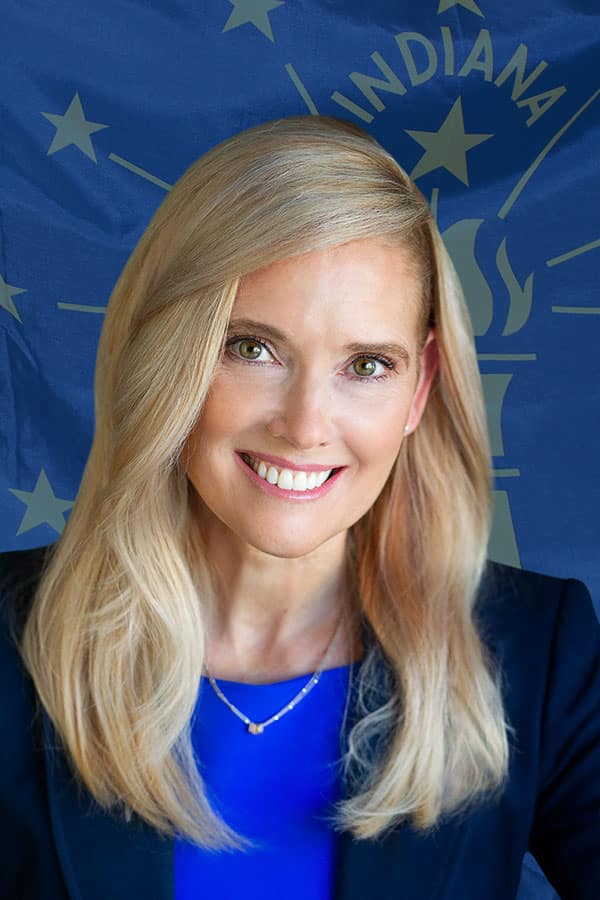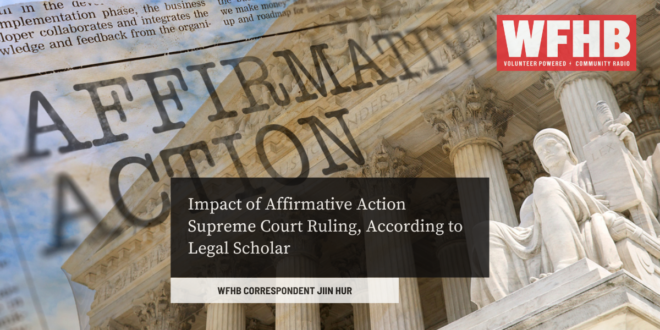Podcast: Play in new window | Download (Duration: 10:10 — 14.0MB)
Subscribe: RSS
On July 29, 2023, the Supreme Court landed a verdict in favor of getting rid of affirmative action in college admissions. The consequence of this? Race cannot be a deciding factor when it comes to the college admissions process.
WFHB News interviewed IU Maurer School of Law Professor Steve Sanders, who teaches constitutional law, constitutional interpretation, family law and constitutional litigation. He told us about the logistics of affirmative action. WFHB also interviewed Indiana District 40 Senator Shelli Yoder, who explained more about the implications of affirmative action encompassing the majority of Monroe County (which includes the Indiana University-Bloomington campus).
Affirmative action gives colleges another “dimension” to look at in terms of the students applying to them. In other words, affirmative action is crucial for a holistic review of academic credentials, extracurricular achievements, and who the person is – to the core. But, if we get rid of this, what is in store for the future of diversity in America?
Sanders explained what affirmative action is.
“In legal context, what we typically mean when we talk about affirmative action, is an official government policy that takes account of race and uses it as a decision-making factor in a positive way. [It] notes for example that an applicant [applying] to a university or law school is Black or Hispanic or Asian and takes that formally into account, usually in a positive way, in making a decision about that person,” said Sanders.

Sanders elaborates why he thinks the dissenting justices (Justices Sonia Sotomayor, Elena Kagan, and Ketanji Brown Jackson) are correct in arguing that it “rolls back decades of precedent and momentous progress.”
“Well, it does, as I said, it had been the the law of the Supreme Court based on a 2003 decision, that it was limited form I described. Affirmative Action was okay. And so the Supreme Court in this case, didn’t admit that they were overturning a precedent. But that’s really what the decision announced, if you leave, read the legal reasoning in the decision that really guts, the core principles and the core theory and logic of that 2003 Grettir decision. And so I think the dissenting justices are correct that this decision does overturn precedent, it rolls back a couple of decades of precedent,” explained Sanders.
Sanders also discussed why these top-tier and Ivy League universities find diverse student bodies to be particularly important in the college admissions process.
“There are studies that show that learning takes place more effectively, in a diverse educational setting, that when you have a larger variety of voices, and more perspectives based on race and heritage and upbringing, and family background, that that enriches the educational experience of people that enriches the diversity of viewpoints that are expressed in and the diversity of perspectives that are addressed in the classroom, which sort of, you know, by definition contributes to everyone’s education and everyone’s greater appreciation of the issue,” discussed Sanders.
Now, moving on to Shelli Yoder, who talked about how affirmative action would affect Hoosiers and the IU-Bloomington campus.
First, Yoder explained her initial disappointment after the decision had been released.
“In June of this past year, I was incredibly disappointed to say the least, all Hoosiers do better from the boardroom to the classroom when we are more diversified. And when our classrooms and those boardrooms better reflect the population of Indiana or the United States. That is better for us all. And the ruling that came down in November, we felt like we were taking steps that felt more like decades backwards,” explained Yoder.

Yoder talked about what IU-Bloomington will do in the up-and-coming school years in order to maintain a diverse environment without affirmative action coming into play.
“Well, fortunately, I know that Indiana University in my district has continued to stress that it will do everything that it can to pursue diversity in its admission to make admissions to make sure that our classrooms are diverse classrooms. And so yes, affirmative action was ruled unconstitutional in this past June, but great universities across Indiana, my university in this district, Indiana University is one that has been very clear that it will do all it can to ensure diversity and its admissions policies,” said Yoder.
Yoder further elaborated on what she has and will bring to the table of affirmative action as our District 40 Senator.
“I’ve tried to focus every year that I have served in the Senate on legislation that acknowledges and lifts up issues of equity and equal access every Hoosier every person deserves a fair shot at leading a happy, successful and prosperous life life. And I will not give up fighting for that ideal on behalf of Hoosiers,” says Yoder.
Sanders answered whether or not affirmative action would stop the efforts of diversity entirely from universities, and provided ways that universities can maintain the same diversity levels from before.
“Not necessarily. It may, in the short run, hinder the…ability of universities to take race into account in making it admissions decision. But, there are lots of other things that universities can do to promote diversity. They can…devote more resources to outreach to say, high schools with large percentages of minority students. They can do greater activities with those students when they visit the campuses to try to persuade them to come to that particular college or university. They can certainly do lots of things to make their campus environment more welcoming to attack incidents of discrimination to engage in diversity education. So, there are lots of things that universities and colleges can do to promote the health of a diverse learning environment in a diverse campus,” explained Sanders.
 WFHB Bloomington Community Radio
WFHB Bloomington Community Radio


